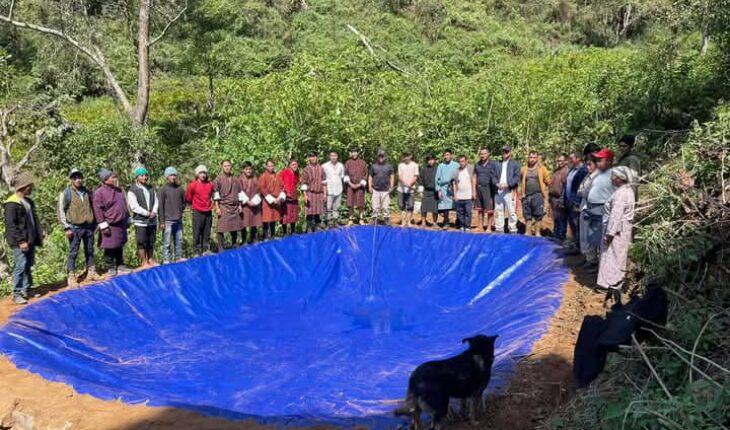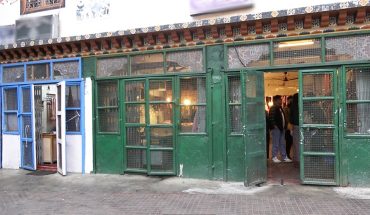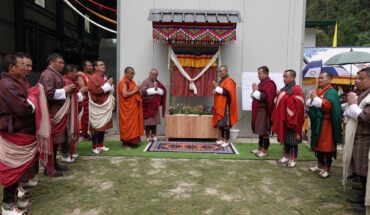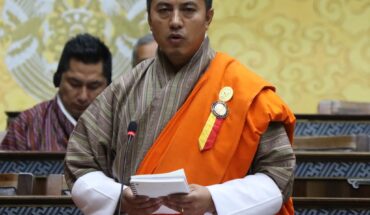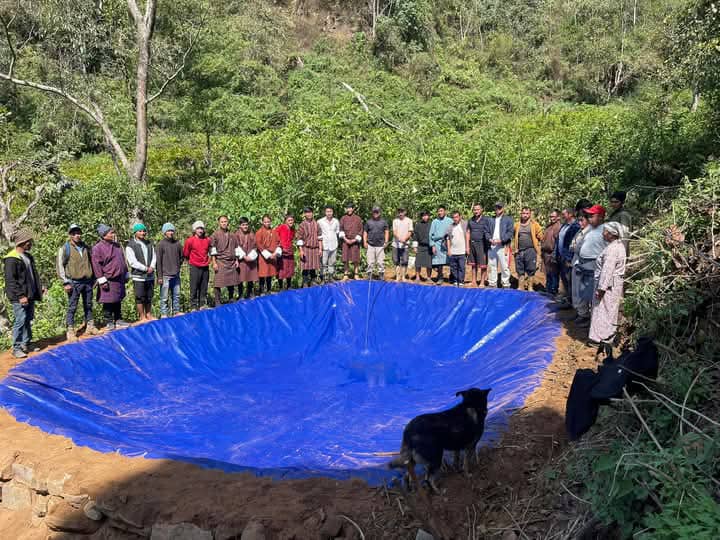
PHUL MAYA TAMANG
Thimphu
Farmers in Chhudzom Gewog, Sarpang, are adopting an innovative approach to water conservation by constructing plastic-lined water harvesting ponds.
This climate-smart irrigation method is designed to tackle water shortages, particularly during the dry winter months when commercial farming faces significant challenges.
By collecting and storing water from small streams, these ponds ensure a reliable water supply for irrigation and various household uses.
Water scarcity has long been a critical issue for farmers in Bhutan, especially in regions like Chhudzom Gewog, where access to consistent irrigation water is limited.
Traditionally, farmers have relied on seasonal rainfall and small streams to sustain their crops. However, unpredictable weather patterns and extended dry spells often disrupt farming activities, reducing agricultural productivity and income.
To address these challenges, plastic-lined water harvesting ponds are being introduced as an efficient and sustainable solution. These ponds are strategically built at elevated locations within fields, allowing farmers to store water during the monsoon and use it throughout the year.
The stored water can be used for irrigation, washing, watering domestic animals, and other household purposes, making it a multipurpose resource that enhances both agricultural and daily life.
Recognizing the benefits of this water conservation method, farmers in Chhudzom Gewog have actively embraced the initiative. A total of 39 farmers have requested the construction of plastic-lined ponds on their lands.
Responding to this demand, the Agriculture Sector in Sarpang Dzongkhag has launched a hands-on training program to equip farmers with the necessary skills to build and maintain these ponds effectively.
The training program is designed to be practical and interactive, ensuring that farmers can construct these ponds independently after completion. Each participant receives a plastic sheet, which is capable of holding approximately 28,000 to 30,000 liters of water.
This capacity is sufficient to sustain irrigation needs for several months, enabling farmers to continue cultivating vegetables and other crops even during the driest periods.
The implementation of this initiative is being supported by the Building Resilient Ecosystems and Community Adaptation (BRECSA) project, which focuses on strengthening climate resilience in rural areas.
BRECSA aims to provide technical assistance, resources, and funding to ensure that small-scale farmers have access to sustainable water management practices.
Through BRECSA’s involvement, the project not only facilitates the provision of plastic sheets but also educates farmers on best practices for water conservation, efficient irrigation techniques, and long-term pond maintenance.
The introduction of plastic-lined ponds is expected to bring significant improvements to commercial farming in Chhudzom Gewog. With a consistent water supply, farmers can grow vegetables and cash crops throughout the year, rather than being limited to the monsoon season.
This shift towards year-round cultivation has multiple advantages of increased productivity with access to stored water, farmers can cultivate multiple crop cycles, resulting in higher yields and greater profitability.
The second advantage is the market expansion as continuous production allows farmers to sell fresh produce even during off-seasons when market prices are higher.
The last is the climate resilience by adopting water harvesting techniques, farmers can mitigate the effects of erratic rainfall and prolonged droughts, ensuring long-term sustainability.
Apart from supporting commercial agriculture, these water harvesting ponds serve several additional purposes. Stored water can be utilized for daily household activities such as washing dishes and clothes, reducing dependence on distant water sources.
Furthermore, domestic animals benefit from an accessible and reliable water supply, improving livestock health and productivity.
Another critical benefit is soil conservation and groundwater recharge. By capturing and storing rainwater, these ponds help prevent surface runoff, which often leads to soil erosion. In addition, the slow percolation of stored water into the ground replenishes underground water tables, further enhancing the region’s water availability.
The challenges include the durability of plastic liners as the longevity of plastic sheets depends on proper handling and maintenance. Farmers need regular training on how to repair minor damages and replace liners when necessary.
The second is the water quality management as stagnant water in the ponds can become a breeding ground for mosquitoes and algae. Simple measures such as adding fish to the ponds or using organic treatments can help maintain water quality.
The other challenge is the upfront costs as although supported by the BRECSA project, additional investments in water pipes and pond excavation may be required and exploring cooperative funding or government subsidies can ease this financial burden for farmers.
The infrastructure development such as improved road networks and transportation facilities are also essential for ensuring that farmers can efficiently access markets and sell their produce.
Similar initiatives have been successfully implemented in other parts of of the country. For instance, in Tsirang Dzongkhag, farmers have reported a threefold increase in vegetable production after adopting plastic-lined water harvesting ponds.
A farmer in Barshong Gewog shared that before having a water harvesting pond, he struggled to irrigate his crops and relied solely on erratic rainfall. However, after constructing a pond, he could cultivate a wider variety of crops, increase his harvest, and generate higher income.
The positive reception of the water harvesting pond project in Chhudzom Gewog opens opportunities for scaling it up across Bhutan.
With continued support from the government, NGOs, and development agencies, similar projects can be expanded to other dzongkhags facing water scarcity.
The construction of plastic-lined water harvesting ponds in Chhudzom Gewog represents a significant milestone in Bhutan’s journey towards sustainable agriculture.
By securing water availability throughout the year, this initiative empowers farmers to increase their productivity, enhance their livelihoods, and adapt to changing climate conditions.
As more farmers adopt this climate-smart approach, the vision of a self-reliant, food-secure, and economically vibrant rural Bhutan becomes increasingly attainable.

